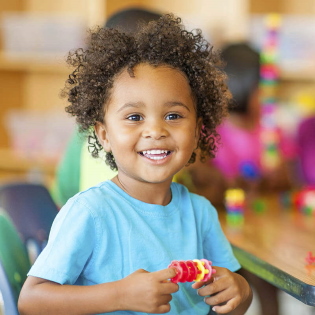Place of Grace Preschool 3 Program

Preschool children are exploding with expanding interests. At this age, they begin to investigate the workings of a widening world and experiment with their emerging use of language. It is a time of enormous educational strides in language and conceptual thinking, and in the development of self and social skills. Children are learning to regulate their needs, wants, and desires in a social system outside of the home. They begin to feel a sense of community and cooperatively engage in play with other children. They begin to understand and replicate written language as a form of communication. Preschool is both a daily place to learn and a place to prepare: to be a three or four year old and enjoy childhood, and to prepare for the life that follows. Excellence in preschool education is about appreciating the child in front of us, while recognizing what the child can become. The 3 and early 4 year old classrooms offer a rich variety of projects and activities that build upon established foundations for learning while focusing on advancing language ability, mathematical reasoning, and scientific thought. Because young children learn best through active interaction with the physical and social environment, the curriculum is focused on allowing children to gain multiple experiences. Well planned learning centers allow for child choice and self-directed play, small groups, and supportive teaching designed to ensure future academic success. The development of language, mathematical reasoning, and scientific thought are emphasized throughout the centers. Teachers reinforce positive interactions and set boundaries to guide the structured classroom routine.
Classroom
The threes and early fours learning environment is based on both the learning centers which are planned and teacher directed as well as activities that allow for child choice, self-directed play, and small groups. The threes and early fours environment recognizes the need for movement and sensory exploration. Learning centers offer guided experiences that encompass all the skills and understandings necessary for optimum development and success in school. Typical centers may include:
| Language/Library | Action/Movement | Group Circle |
| Construction/Blocks | Discovery/Science | Music |
| Dramatic Play | Outdoor Learning | Manipulatives |
| Art/Creative Expression | Outdoor Gross Motor | Sensory Table |
Throughout the day, children make self-directed and guided choices, participate in small groups and projects, and join in very brief circle times with the whole group.
Beginning Self Help
Children in the threes and early fours will begin to master a world of learning self help skills. They will begin to start serving themselves during family style meal times, dress themselves, use manners, and master potty training. They will also develop a sense of ownership of the classroom through daily jobs and responsibilities.
Communication
Documenting and communicating the daily milestones for each child remains of utmost importance for the children in the threes and early fours. Every week the parents will receive a newsletter describing the upcoming activities, theme, goals, notices, and information regarding the classroom lesson plans. The teachers will also provide information each day about the theme and activities, the bible verse, what your child ate, how they slept, potty information, and what to ask your child about to help them to share about their day with you. The daily sheet will include information about any specific behavior or needs that your child may have. Teachers will also communicate information about your child's progress and evaluations, along with the opportunity to schedule a parent teacher conference each quarter. Teachers and administration are also always available to schedule a time to meet with parents should any concerns arise.